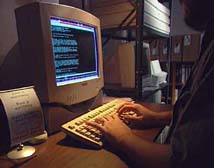The Australian government is planning to get tough on cyber crime.
Published:
20 May 2001 y., Sunday
Stepping in to replace laws that were originally drawn up in the 1980s, a bill to go before Parliament shortly will lift the maximum penalty for computer crime to at least ten years in jail.
Federal Justice Minister Chris Ellison said Monday that targets specifically include computer hacking and will establish new criminal offences for spreading viruses, cyber-stalking and electronic fraud.
Law enforcement authorities will be given extra powers to access people's computers when investigating cyber crimes. The proposed investigatory powers had been checked out with Australia's privacy commissioner, the Minister said.
Ellison earlier this year released a Model Criminal Code Report aimed at helping state and federal authorities deter and punish computer crime.
New offences recommended in the code paper specifically targeted denial-of-service attacks as an offence to be billed as "unauthorised impairment of electronic communication." Offenders could be jailed for up to ten years.
The report also included a new "sabotage" offence, covering all kinds of terrorist attacks, including those initiated by computers - maximum penalty, 25 years. It was not clear Monday whether this provision will be included in the new bill.
Other offences will include: the possession of or trading in programs and technology designed to hack into other people's computer systems, with a three-year penalty.
The proposed offences are said to be consistent with international developments such as last year's Council of Europe draft cyber crime convention.
The code paper is on the Web at: http://law.gov.au/publications/Model_Criminal_Code/index.htm .
Šaltinis:
Newsbytes.com
Copying, publishing, announcing any information from the News.lt portal without written permission of News.lt editorial office is prohibited.
The most popular articles
Software company announced new structure_ of it_s business.
more »
 A number of MEPs urged Internal Market Commissioner Michel Barnier to come up with common rules to regulate cross border online gambling in Europe.
more »
A number of MEPs urged Internal Market Commissioner Michel Barnier to come up with common rules to regulate cross border online gambling in Europe.
more »
 Think before you post as once you do it is online forever. That was the message on Safer Internet Day marked on 9 February by a seminar in the European Parliament.
more »
Think before you post as once you do it is online forever. That was the message on Safer Internet Day marked on 9 February by a seminar in the European Parliament.
more »
 50% of European teenagers give out personal information on the web – according to an EU study – which can remain online forever and can be seen by anybody.
more »
50% of European teenagers give out personal information on the web – according to an EU study – which can remain online forever and can be seen by anybody.
more »
 When did the Commission start working on social networking sites?
more »
When did the Commission start working on social networking sites?
more »
 ICSA Labs, an independent division of Verizon Business, is the first independent security-product testing and certification laboratory to earn ISO/IEC 17025 accreditation, validating the laboratory's world-class capabilities.
more »
ICSA Labs, an independent division of Verizon Business, is the first independent security-product testing and certification laboratory to earn ISO/IEC 17025 accreditation, validating the laboratory's world-class capabilities.
more »
 From today, European citizens, businesses and organisations can register .eu website names using characters from all 23 official languages of the European Union.
more »
From today, European citizens, businesses and organisations can register .eu website names using characters from all 23 official languages of the European Union.
more »
 Authorities investigated 301 mobile phone services websites in follow-up to EU crackdown on misleading consumer practices.
more »
Authorities investigated 301 mobile phone services websites in follow-up to EU crackdown on misleading consumer practices.
more »
 After nearly 2 years of legislative work the Telecom Package is due to be put to a final vote in Parliament on 24 November in Strasbourg.
more »
After nearly 2 years of legislative work the Telecom Package is due to be put to a final vote in Parliament on 24 November in Strasbourg.
more »
 The Christian Science Monitor reports that three men have been named as being the masterminds behind the hacking of RBS WorldPay, a subsidiary of the Royal Bank of Scotland.
more »
The Christian Science Monitor reports that three men have been named as being the masterminds behind the hacking of RBS WorldPay, a subsidiary of the Royal Bank of Scotland.
more »
 BAI’s Banking Strategies Insights reports that banks must get serious about improving their ATMs, especially in the area of envelope-free deposit.
more »
BAI’s Banking Strategies Insights reports that banks must get serious about improving their ATMs, especially in the area of envelope-free deposit.
more »